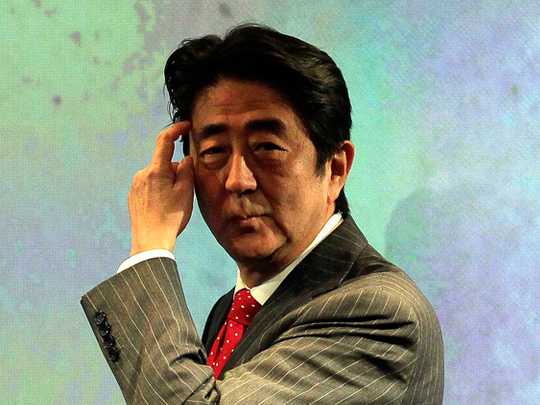
With the world producing more history than most of us can consume right now, it is easy to lose sight of recent developments that could have even greater consequences for long-term peace and stability than recent alarming events in eastern Ukraine, Gaza and Syria-Iraq. The outcome of the nuclear negotiations with Iran, the change of leadership in India and Indonesia — two of the world’s three largest democracies — and the re-energising of the Brics group of major non-western states (Brazil, Russia, India, China and South Africa) may all be such game changers.
However, Japan’s international muscle-flexing under Prime Minister Shinzo Abe may be even more significant. Unless it is very carefully managed by all concerned, including the US and Japan’s other closest Asia-Pacific allies, Abe’s makeover of Japanese foreign policy could undermine the fragile power balances that have so far kept the Sino-American rivalry in check. Japan is right to be concerned about China’s new regional assertiveness and Abe’s recent diplomatic push to strengthen Japan’s relations in Southeast Asia, and with Australia and India, is understandable in that context. Nor is it inherently unreasonable — despite opposition at home and abroad — for his government to seek to reinterpret Article 9 of Japan’s “peace constitution” to permit wider engagement in collective self-defence operations and military cooperation with allies and partners.
However, the risks in all of this must be openly acknowledged. Opposition to any perceived revival of Japanese militarism is hard-wired in Northeast Asia. Abe is an intensely conservative nationalist, still deeply reluctant to accept the extent of Japan’s Second World War guilt (even when acknowledging, as he did in Australia recently, “the horrors of the past century’s history” and offering gracious condolences for “the many souls who lost their lives”). His refusal to rule out future visits to the Yasukuni Shrine, with its war-glorifying Yushukan Museum alongside, fuels hardline scepticism in China. It also makes common cause with South Korea much more difficult and heightens the risk of maritime territorial disputes becoming explosive.
Less noticed, but possibly more important in the long term, have been Japan’s efforts to reshape regional security arrangements, which for many years have had three key elements. First, there have been the hub-and-spoke alliances of the US with Japan, South Korea and Australia (and more loosely with Singapore, Thailand, and the Philippines). These alliances are accepted and well understood, if not loved, by China.
Second, there are national defence efforts, encouraged by the US, increasingly aimed at greater self-reliance in the event that China’s rise becomes a military threat. This, too, has been accepted reasonably calmly, if not always quietly, by China, and has not undermined the continuing growth in bilateral economic relationships that every country in the region is developing with China.
Finally, there have been multilateral security dialogues — the Asean Regional Forum and now the East Asia Summit the most prominent among them — designed to be vehicles for confidence-building and conflict prevention and management. These mechanisms have so far promised more than they have delivered, though not for want of continuing efforts to give them more clout.
For all of the hype that has accompanied the US “pivot” to Asia — announced by President Barack Obama in the Australian parliament in November 2011 — the delicate balances involved in this basic architecture have changed little for decades. But now Japan, with overt support from Australia in particular, seems determined to change the balance by establishing, as a counterweight to China, a much denser alliance-type relationship with selected partners.
Abe spoke repeatedly in the Australian parliament last month of Japan’s new “special relationship” with Australia — terminology normally associated only with the strongest of alliance partnerships — and followed his address by signing an agreement for the transfer of defence equipment and technology. Australian Prime Minister Tony Abbott, who earlier this year described Japan as both “best friend in Asia” and a “strong ally”, has warmly embraced the “special relationship” language. He consummated the love-in by expressing his admiration for “the skill and sense of honour” of the Japanese submariners who died attacking Sydney Harbour in 1942, while saying of Japan’s waging of aggressive war and wartime atrocities only that “we disagreed with what they did”.
We have not yet seen any renewed attempt to re-establish the “Quadrilateral Security Dialogue”, comprising Japan, Australia, the US and India, which conducted joint military exercises in 2007 and was seen by China as a hostile containment enterprise. But it is not hard to imagine that this is still very much on Abe’s wish list.
The dangers should not be exaggerated, but with strategic competition between the US and China as delicately poised as it is, and with the economic interests of Australia, Japan, and many others in the region bound up just as intensely with China as their security interests are with the US, rocking the boat carries serious risks. Countries like Australia should take a clear stand when China overreaches externally (as it has in the South China Sea with its indefensible “nine-dashed line” asserting historical rights with no known justification in international law). The same applies when China does not behave like a good international citizen on the United Nations Security Council or should it commit egregious human-rights violations at home.
But Australia should be cautious about moving beyond taking stands to taking sides in the region to a greater extent than has been the norm for decades. Kishore Mahbubani has argued recently that Australia need to recognise that in China, as elsewhere, a significant internal contest between hard and soft-liners is taking place. To the extent that this is the case, it is smart policy for every state in the region to speak and act in a way that helps the doves and gives no encouragement to the hawks.
— Project Syndicate, 2014
Gareth Evans was Australia’s Foreign Minister from 1988 to 1996, and president of the International Crisis Group from 2000 to 2009.








